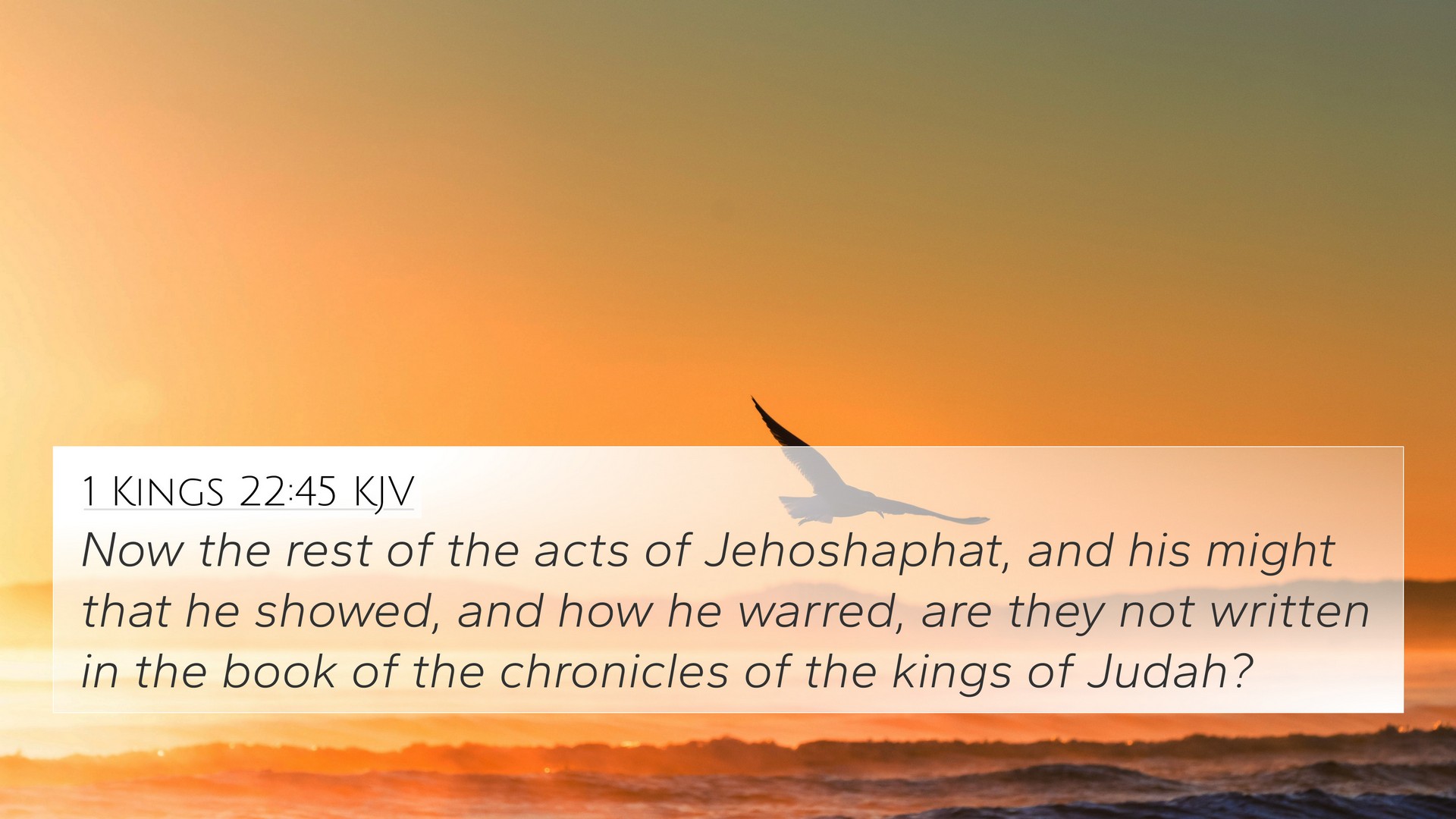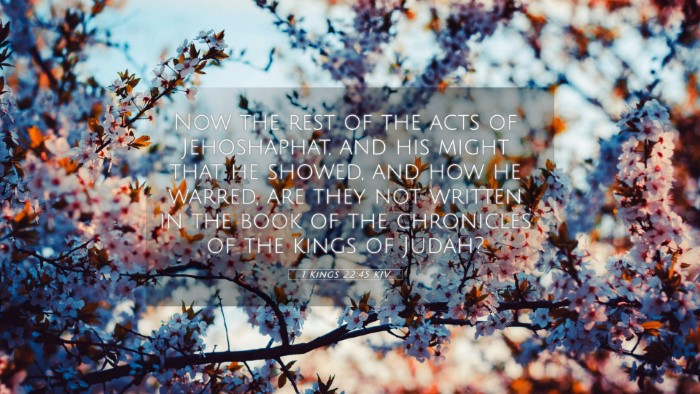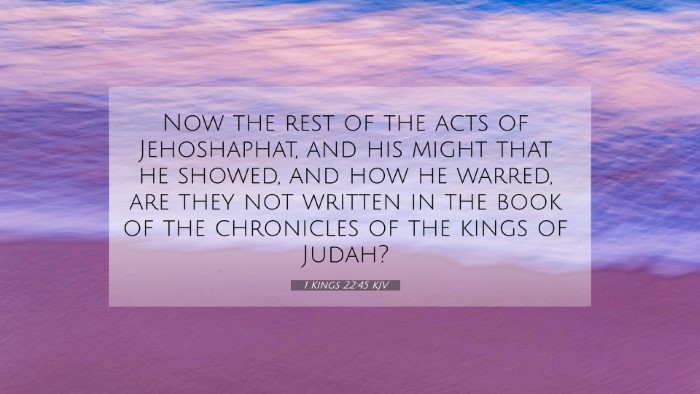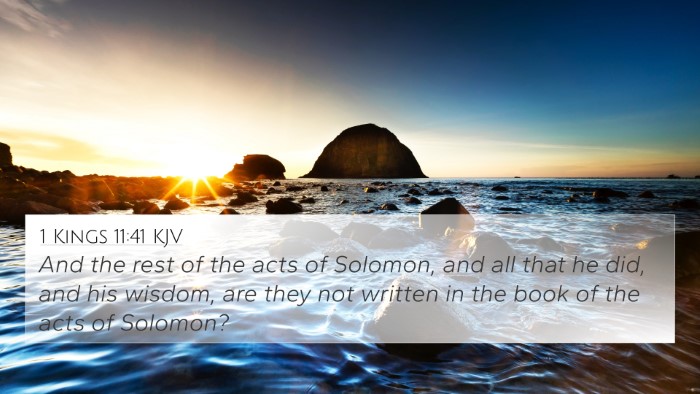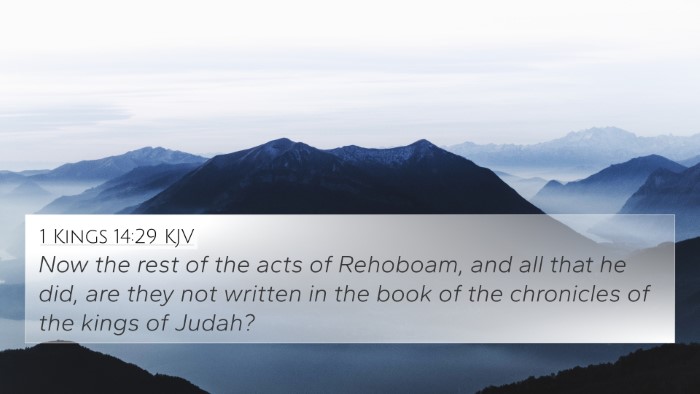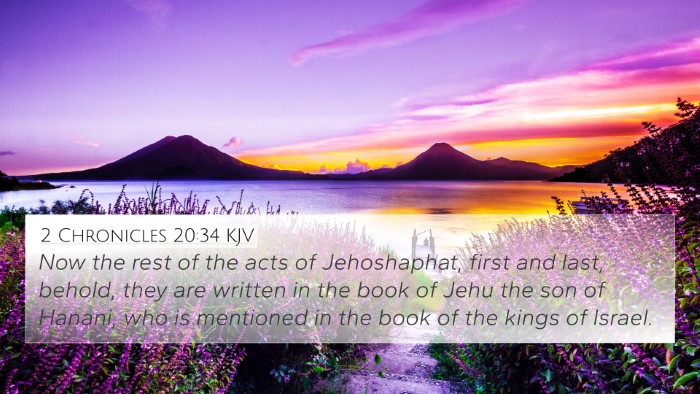Understanding 1 Kings 22:45
1 Kings 22:45 states, "Now the rest of the acts of Jehoshaphat, and his might that he shewed, and how he warred, are they not written in the book of the chronicles of the kings of Judah?" This verse concludes the account of King Jehoshaphat's reign, highlighting both his military endeavors and his spiritual leadership.
Summary of Insights from Public Domain Commentaries
Various biblical scholars provide insights into this verse, each elucidating its significance within the historical and spiritual context of Judah during Jehoshaphat's reign.
-
Matthew Henry's Commentary:
Matthew Henry emphasizes Jehoshaphat's noteworthy deeds and his dedication to seeking the Lord's guidance in his decisions. Henry views the mention of "the book of the chronicles of the kings of Judah" as a call for future generations to reflect upon the deeds of their leaders, understanding that history serves as a testament to God's covenant with His people.
-
Albert Barnes' Notes:
Albert Barnes accounts for the historical context of Jehoshaphat's rule, noting his significant military victories and diplomatic relations, particularly with Israel. He suggests that the references to chronicles serve as a reminder of the importance of recording historical events for the understanding of God's work through leaders.
-
Adam Clarke's Commentary:
Adam Clarke highlights the dual nature of Jehoshaphat's accomplishments—both his zeal for spiritual reform and his military might. Clarke notes that the chronicler sets the stage for future readers to consider the legacy of Jehoshaphat as both a king and a servant of the Lord.
Cross-References and Thematic Connections
1 Kings 22:45 connects to several other Biblical scriptures, illustrating themes of leadership, faithfulness, and the preservation of history:
- 2 Chronicles 20:31-33: Details Jehoshaphat's reign and reforms, emphasizing his commitment to the worship of Yahweh.
- 1 Kings 15:34: Echoes the importance of historical chronicles concerning kings and their actions.
- 2 Chronicles 17:3-6: Discusses Jehoshaphat's faithfulness to God and initiatives for spiritual revival.
- 2 Kings 4:1: Although different in context, it prompts reflections on the faithful acts of God's people as recorded in Scripture.
- Proverbs 10:7: “The memory of the just is blessed,” supporting the idea that good deeds are remembered and recorded.
- Psalm 78:4: Emphasizes recounting the deeds of Jehovah to ensure they are remembered by future generations.
- Hebrews 11:32-34: Reminds us of the faithful actions of past leaders, encouraging us to reflect on their legacies.
- 1 Timothy 2:2: Advocates for prayers for rulers, linking to the importance of righteous leadership.
Thematic Bible Verse Connections
The themes prevalent in 1 Kings 22:45 resonate throughout the Bible, encouraging readers to explore how leadership and faithfulness are portrayed within scriptures.
- Leadership and Governance: The importance of righteous leaders is a recurrent theme, as seen in Romans 13:1.
- Spiritual Reformation: The theme of returning to God, as illustrated in 2 Chronicles 7:14, resonates with Jehoshaphat's reign.
- Faith in Adversity: The reliance on God's guidance in difficult times, found in Isaiah 41:10.
- The Legacy of Kings: Reflection on the past kings can be seen in 2 Samuel 23:1-2, highlighting the weight of their words and actions.
Cross-Referencing Biblical Texts
When engaging in Bible cross-reference studies, one can utilize various tools to delve deeper into the meanings of scriptures and their interconnections.
- Bible Concordance: A useful resource for finding specific terms and their occurrences throughout the Bible.
- Bible Reference Resources: Numerous guides exist to assist in discovering thematic connections between verses.
- Bible Chain References: Following a sequence of related scriptures can uncover profound insights into Biblical themes.
Practical Applications
Understanding the implications of 1 Kings 22:45 can inspire individuals to reflect on the significance of leadership in their own lives, whether in a familial, communal, or spiritual context.
- Personal Reflection: Consider how your actions and decisions impact those around you and are recorded in history.
- Leadership Roles: For those in leadership, strive to embody the qualities seen in biblical kings like Jehoshaphat.
- Spiritual Legacy: Observe how your faithfulness can inspire future generations to walk in righteousness.
Conclusion
1 Kings 22:45 encapsulates the essence of Jehoshaphat's kingship and the importance of both historical and spiritual accountability. Through cross-referencing with other biblical texts, individuals can find rich insights and encouragement in their personal and communal faith journeys.
